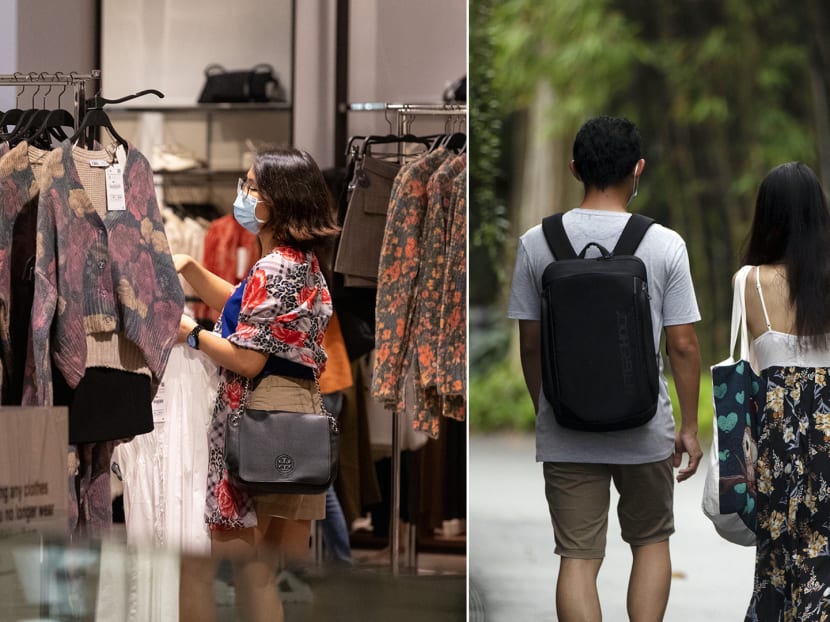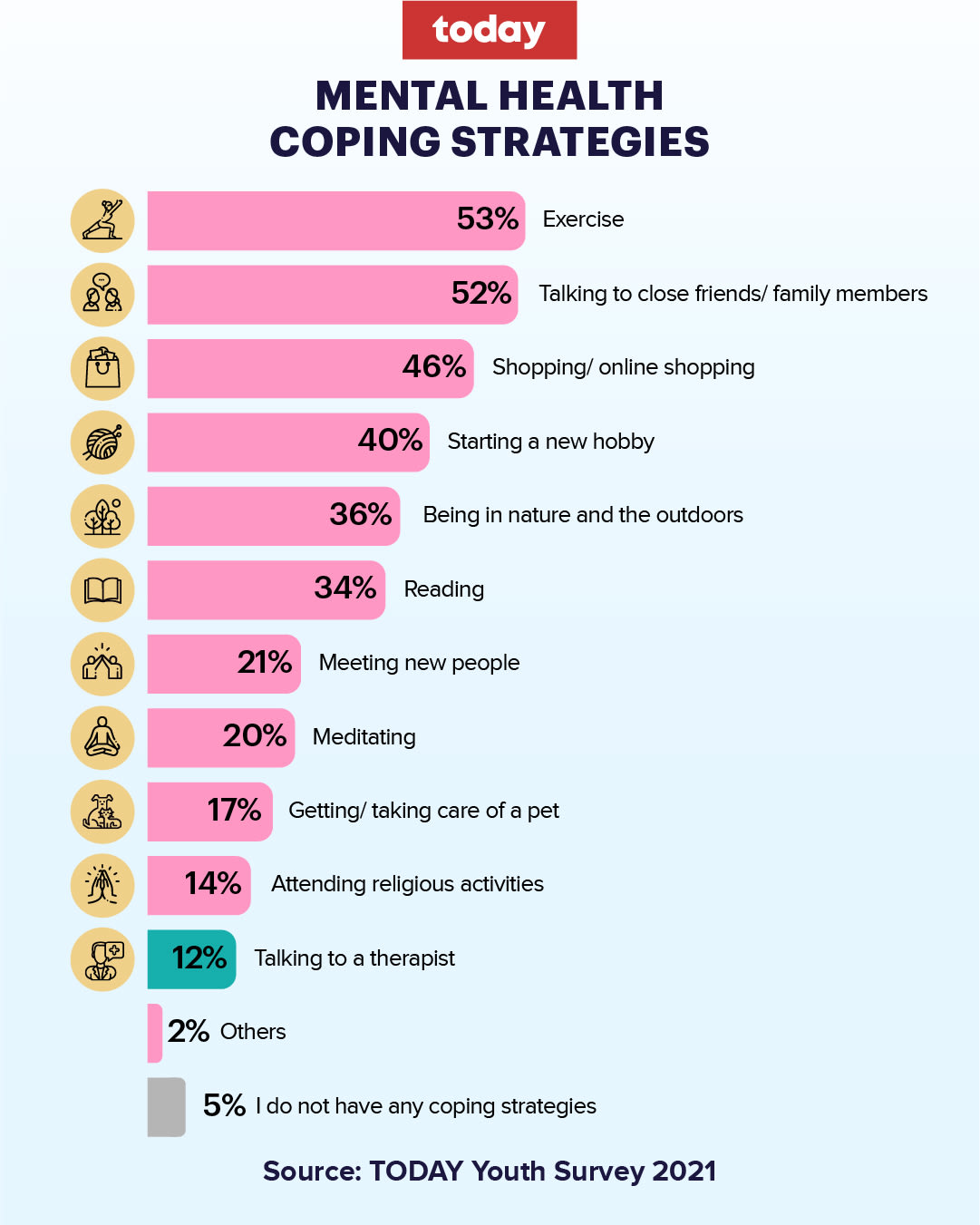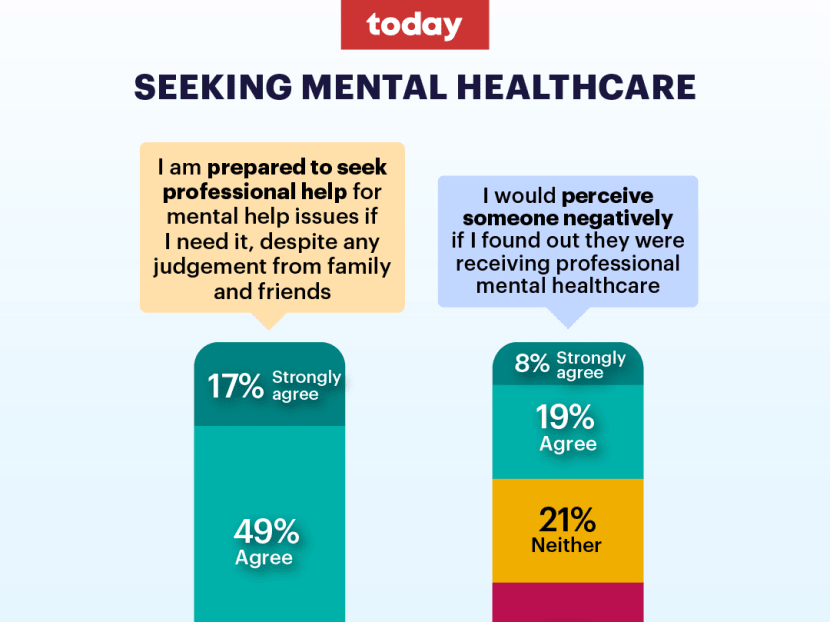TODAY Youth Survey: Amid Covid-19 stress, youths turn to exercise, shopping but also bingeing on snacks, social media
SINGAPORE — Freelancer Sonia Vanan said that she was not one to shop online much before the Covid-19 pandemic, but she now finds herself spending as much as S$3,000 a month on everything from smart home appliances to beauty products.

Exercising (53 per cent), talking to loved ones (52 per cent) and shopping (46 per cent) were the top three coping mechanisms from a list of coping mechanisms respondents could choose from.
SINGAPORE — Freelancer Sonia Vanan said that she was not one to shop online much before the Covid-19 pandemic, but she now finds herself spending as much as S$3,000 a month on everything from smart home appliances to beauty products.
“Most of my expenses (before the pandemic) were channelled into transportation and travelling,” the 25-year-old said. “When the pandemic hit, I saw I had these extra finances. Boredom and the convenience of e-commerce significantly increased my propensity to shop.”
In the absence of travel and other social activities that used to be possible, the instant gratification of online shopping provides her with the stimuli she needs, adding an element of excitement and surprise to the dull routine of pandemic life, she said.
“It also feels like a reward to myself to keep going.”
Sonia is certainly not alone in her new pastime. A survey by TODAY of 1,066 respondents, between the ages of 18 and 34, found that many have turned to various coping mechanisms — both healthy and not so healthy — to tide themselves through the pandemic.
The inaugural annual TODAY Youth Survey seeks to give voice to millennials and Gen Zers on societal issues and everyday topics close to their hearts.
The wide-ranging survey, which is demographically representative, covers six topics: Racism, religion, LGBTQ (lesbian, gay, bisexual, transgender and queer) attitudes, gender dynamics, the impact of Covid-19 on mental well-being and social ties, and career and material success.
Conducted in early October, TODAY Youth Survey 2021 found that among the list of coping mechanisms respondents could choose from, the top three were exercising (53 per cent), talking to loved ones (52 per cent) and shopping (46 per cent).
Starting a new hobby, being in nature and the outdoors, reading, meeting new people and meditating followed.

The survey also found that there was a distinct gender difference in the popularity of three particular pastimes, namely, talking to close friends and loved ones, online shopping and meeting new people.
- 60 per cent of women said that they spoke to friends and loved ones to cope with the stress of the pandemic, but only 44 per cent of men said that they did so.
- 55 per cent of women said that they turned to online shopping, but just 36 per cent of men said they did the same
- 27 per cent of men said that they liked meeting new people, but only 14 per cent of women chose this option
Rishi Mahendran, 32, is among the men who has actively sought to meet new people during the pandemic, saying that he decided to expand his social circles so that he could find more people to take part in activities together.
“I have been involved in team sports like floorball and hockey. So in this environment where that is not practical, I turned to individual sports like tennis and cycling, and since my circle of friends in those places are limited, I felt like expanding them,” the public servant said.
He added that he had also decided to seek new friendships and relationships because most of his friends are married.
For 26-year-old Ris Gomez, who works in cyber security, he said that he felt lonely during the pandemic since he was staying home more, and this made him think more about his future and finding a partner.
“It’s because of the uncertainty of everything, which is why we try forming emotional connections with others as that is something we have control over,” he added.
Mr Praveen Nair, a psychologist at Raven Counselling and Consultancy, said that the gender differences in hobbies could be rooted in history.
Shopping holds out the promise of controlling one's destiny, which historically has not always been possible for women, and that could be why shopping has developed into a popular pastime for women, he explained.
“Men, on the other hand, may be influenced by their ‘hunter-role’ from the past. The role of the hunter is often that which is enamoured with seeking new stimuli.”
Dr Joel Yang, a clinical psychologist at Mind What Matters, noted that men tend not to have social support networks that are as strong as women’s. Therefore, it is not surprising that during the pandemic, some men started to look for these networks.
SEEKING MENTAL HEALTHCARE
The survey found that 66 per cent of respondents would be willing to seek mental healthcare despite any judgement from others.
The willingness to seek professional help for mental health conditions was especially high among those with a higher monthly household income of S$10,000 and above (71 per cent) and married individuals (76 per cent).
The survey also found that only 27 per cent of all respondents would perceive someone negatively if they found out that the person was seeking mental health treatment.
However, despite the lack of stigma surrounding professional help among the youth, talking to a therapist came low in the list of coping mechanisms that respondents had taken up, with only 12 per cent reporting that they had done so.

One 28-year-old, who wanted to be known only as Tiffany, said that even though she considered it and was open to the idea, she was eventually put off by the obstacles of finding a therapist.
She had had a hard time adapting to working from home, especially when lines between work and home began to blur. The end of a relationship also added to her emotional and mental stress.
“I tried searching (for therapists) but the prices scared me off. Also, my friends said that therapists tend to just prescribe pills, instead of having a real therapy session,” she said.
“And I feel there’s still a stigma in Asian families. I’ve raised it up to my mum previously but she just brushed it off.”
A marketer who wanted to be known only as Ms Way, 27, said that finding a therapist is similar to dating — you have to find one you click with and you have to feel comfortable opening up to the person.
“I am sceptical that I would be able to find that person. And how much money is it going to cost for me to find that person? So with everything else that's going on, it's just been bumped down the list of priorities,” she said.
Ms Way had previously visited a psychiatrist through the public healthcare system, but there were often long waiting times of about a month between appointments and by then, she would “feel okay”, she said. This meant that her sessions turned out to be rather unproductive.
Mr Nair agreed that there is still a stigma around mental health therapy in Singapore because there is a perception that asking for help shows that one is weak.
He added that finding a suitable mental health professional is also a trial-and-error process that many may not want to put themselves through.
Dr Yang from Mind What Matters noted that for many people, the cost of private healthcare options and the long waiting times for public ones are deterring factors.
Not knowing how to navigate Singapore’s mental healthcare scene, for example, not knowing where to seek help and not knowing the difference between a clinical psychologist, a counsellor and a psychiatrist might also add to the challenge, he added.
“People may also not know when they should speak to a therapist. They may believe that therapy is only reserved for more ‘serious’ mental health issues like suicidal behaviour.”
NEGATIVE HABITS PICKED UP DURING PANDEMIC
When asked about the negative habits they had picked up during the pandemic, the top three answers were mindless social media scrolling, TV bingeing and snacking.
These habits are understandable since people may be spending more time at home, where these behaviours are likely to be naturally occurring, Mr Nair said.
Dr Yang agreed, adding that with people having to cope with the stress of the pandemic, there has been an increased drive for what psychologists call “positive affect” — and social media and TV provide instant gratification and stimulation.
He added that it is also possible that more people are engaging in mindless social media scrolling because they want to feel connected to others during a time when everyone feels isolated from the rest of the world, due to restrictions imposed during certain periods.
Dr Yang said that people may find it more difficult to keep up their productivity levels because they may be too anxious about their personal circumstances or the global situation.
The pandemic has also left many people with a sense of hopelessness, he said.
“All of us are experiencing grief during this pandemic, whether we recognise it or not. We’re also experiencing ambiguous loss — a loss that occurs without closure or clear understanding.”
Following the top three negative habits that respondents had picked up during the pandemic, the next three most commonly given replies were “becoming more sedentary”, drinking and smoking.
In particular, the survey found that millennials in more affluent households were more likely to have picked up drinking and smoking during the pandemic.
A 26-year-old who works in the healthcare industry and who declined to be named said that he began drinking during the semi-lockdown last year because he was stressed out while completing his university thesis. He was also unemployed and waiting to begin a new job at the time.
“One of the things I did to pass the time was to get on Skype and play games with friends. And usually, we’d have drinks to recreate some social aspect to it,” he said. “This then extended into a small habit of having drinks on my own because I found that it relaxed me and made me more present when I was doing so many things alone.”
Mr Nair noted that youth in more affluent households may have more disposable income and perhaps even greater access to alcohol within their own homes. They are also more likely to have larger homes, with more space for them to have privacy to indulge in unhealthy habits such as drinking and smoking.
He said that although everyone has their own strategies to better cope emotionally with a crisis such as Covid-19, in general, young people may want to do the following:
- Reduce the use of screen time and social media, as its algorithms are set to trigger negative mindsets
- Expose themselves more to nature by taking walks or exercising outdoors
- Cultivate a daily routine
- Volunteer for the needy or disadvantaged
- Seek help from mental health professionals such as counsellors and psychologists
This is the second instalment of a five-part series on the findings of the TODAY Youth Survey 2021. Look out for our daily reports this week on the survey topics of racism, religion, LGBTQ attitudes, gender dynamics, the impact of Covid-19 on mental well-being and social ties, and career and material success. We will also be holding a webinar series on Instagram and TikTok to discuss the survey findings.








